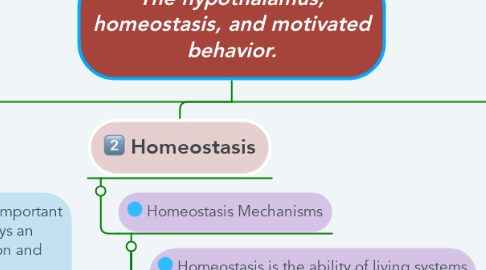
1. Hypothalamus
1.1. The hypothalamus is a small but important area in the center of the brain. It plays an important role in hormone production and helps to stimulate many important processes in the body and is located in the brain, between the pituitary gland and thalamus.
1.2. Function
1.2.1. body temperature
1.2.2. thirst
1.2.3. appetite and weight control
1.2.4. emotions
1.2.5. sleep cycles
1.2.6. blood pressure and heart rate
1.2.7. childbirth
1.2.8. production of digestive juices
1.2.9. balancing bodily fluids
1.3. Hormones of the hypothalamus
1.3.1. antidiuretic hormone
1.3.2. corticotropin
1.3.3. gonadotropin
1.3.4. oxytocin
1.3.5. prolactin
1.3.6. thyrotropin
2. Homeostasis
2.1. Homeostasis Mechanisms
2.1.1. Homeostasis is the ability of living systems to maintain a steady and uniform internal environment to allow the normal functioning of the systems.
2.1.2. Stimulus
2.1.3. Sensor/ Receptor
2.1.4. Control unit
2.1.5. Effector
3. Motivated behavior.
3.1. Motivation is the process that initiates, guides, and maintains goal-oriented behaviors. It is what causes you to act, whether it is getting a glass of water to reduce thirst or reading a book to gain knowledge. Motivation involves the biological, emotional, social, and cognitive forces that activate behavior. In everyday usage, the term "motivation" is frequently used to describe why a person does something. It is the driving force behind human actions.
3.2. Types
3.2.1. Extrinsic motivations
3.2.1.1. are those that arise from outside of the individual and often involve rewards such as trophies, money, social recognition, or praise
3.2.2. Intrinsic motivations
3.2.2.1. are those that arise from outside of the individual and often involve rewards such as trophies, money, social recognition, or praise.
3.3. Instincts
3.3.1. The instinct theory of motivation suggests that behaviors are motivated by instincts, which are fixed and inborn patterns of behavior.5 Psychologists including William James, Sigmund Freud, and William McDougal have proposed a number of basic human drives that motivate behavior. Such instincts might include biological instincts that are important for an organism's survival such as fear, cleanliness, and love.
3.4. Drives and Needs
3.4.1. Many of your behaviors such as eating, drinking, and sleeping are motivated by biology. You have a biological need for food, water, and sleep. Therefore, you are motivated to eat, drink, and sleep. Drive theory suggests that people have basic biological drives and that behaviors are motivated by the need to fulfill these drives.
3.5. Arousal Levels
3.5.1. The arousal theory of motivation suggests that people are motivated to engage in behaviors that help them maintain their optimal level of arousal. A person with low arousal needs might pursue relaxing activities such as reading a book, while those with high arousal needs might be motivated to engage in exciting, thrill-seeking behaviors, such as motorcycle racing.

